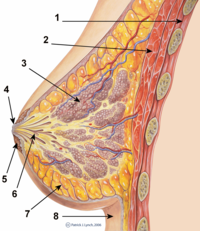
Photo from wikipedia
Branching morphogenesis depends upon extracellular matrix remodeling and dynamic cell-cell and cell-extracellular matrix interactions, although how this developmental program is coordinated remains unclear. Expression profiling of mammary tissue at different… Click to show full abstract
Branching morphogenesis depends upon extracellular matrix remodeling and dynamic cell-cell and cell-extracellular matrix interactions, although how this developmental program is coordinated remains unclear. Expression profiling of mammary tissue at different stages of branching morphogenesis combined with histological and functional studies identified the histone deacetylase (HDAC) regulator, nuclear receptor co-repressor 2 (N-CoR2), as a key orchestrator of adhesion-dependent branching morphogenesis in the mammary gland. Molecular studies revealed that N-CoR2 actively represses fibronectin (FN) and thrombospondin-1 (THBS-1) promoter accessibility in an HDAC-dependent manner. Consistently, histological analysis revealed that N-CoR2 is abundantly expressed in the luminal epithelial cells localized along the outer rim of invading terminal end buds (TEB) and that its expression is lowest at sites of TEB branching bifurcation. In addition, reducing N-CoR2 expression drove the scattering of human mammary acini in vitro and promoted promiscuous branching of humanized mouse mammary tissue in vivo , suggesting that downregulation of N-CoR2 is required for branching morphogenesis in mammary gland. Furthermore, downregulation of N-CoR2 in breast cancer cells increased the expression of both FN and THBS-1 and reduced the expression of E-cadherin and enhanced the migratory capability of breast cancer cells. Intriguingly, immunohistochemical and clinical correlative analysis indicated that loss of N-CoR2 correlates with perturbed cell-cell and enhanced cell-ECM adhesion and acquisition of an invasive phenotype and local lymph node metastasis in a subset of breast carcinomas. These findings suggest N-CoR2 may epigenetically regulate adhesion-dependent branching morphogenesis in the mammary gland and that its loss could promote malignant progression of some breast cancers. Citation Format: Shenq-Shyang Huang, Valerie M. Weaver, Kelvin K.C. Tsai. N-CoR2 epigenetically regulates adhesion-dependent branching morphogenesis and its loss correlates with malignant progression of the mammary gland [abstract]. In: Proceedings of the American Association for Cancer Research Annual Meeting 2019; 2019 Mar 29-Apr 3; Atlanta, GA. Philadelphia (PA): AACR; Cancer Res 2019;79(13 Suppl):Abstract nr 5184.
Journal Title: Cancer Research
Year Published: 2019
Link to full text (if available)
Share on Social Media: Sign Up to like & get
recommendations!